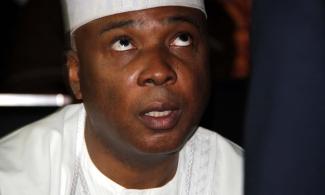
Federal High Court Judge Abdulkadir Kafarati has finally tossed the controversial human rights case filed by embattled Senate President Bukola Saraki, as SaharaReporters relentlessly exposed intrigues around the case.
Mr. Saraki had sought to use the controversial judge to stop his trial at the Code of Conduct Tribunal (CCT) where he faces charges of false declaration of assets and corrupt enrichment.
Through his lawyer, Prince Ajibola Oluyede, Senator Saraki had asked the court to stop the proceedings before the CCT, claiming the trial violated his rights to fair hearing. Justice Kafarati decided to take up the case even after another Federal High Court in Lagos manned by Justice Ibrahim Buba declined jurisdiction in the case and even after the Supreme Court of Nigeria had ruled that the CCT was competent to try Saraki for corruption.
However, as SaharaReporters exposed the deal behind the case, Justice Kafarati suddenly recused himself from the case on March 22 claiming his reputation had been impugned by our revelation that he was the target of an investigation by agents of the Economic and Financial Crimes Commission (EFCC). EFCC investigators found more than N2 billion in the judge’s account, and the judge claimed that the funds were from transactions done by his farms.
One legal observer in court today told our correspondent that Justice Kafarati’s decision to hear Mr. Saraki’s case was highly suspect, adding that the judge’s verdict was likely a mere face-saving measure.
In the ruling Justice Abdu-Kafarati held that he lacked jurisdiction to entertain Senator Saraki's lawsuit, filed under the fundamental human rights enforcement rules, claiming it constituted an abuse of court process.
Mr. Saraki had sued the Attorney-General of the Federation, Abubakar Malami, the Economic and Financial Crimes Commission, the Independent Corrupt Practices and other Related Offences Commission, the Inspector General of Police, Solomon Arase, the Code of Conduct Bureau and its chair as well as co-panelist Danlami Umar and Ataedzeagu Adza. Also joined in the suit were the chair of the Code of Conduct Bureau, Sam Saba, and the Director of Public Prosecutions in the Federal Ministry of Justice, Mohammed Diri.
According to a report from Punch newspaper, the judge upheld the federal government’s preliminary objection to the lawsuit without considering the merit of the case. He ruled that the court lacked jurisdiction to entertain the suit, adding that the order that Mr. Saraki sought was not available under Chapter 4 (which deals with fundamental human rights) of the Constitution.
The judge also ruled that the lawsuit constituted an abuse of court of process, the Supreme Court having earlier validated the senator’s trial before the CCT and Mr. Saraki having filed a similar application before the CCT.
The court ruled that granting the prayers sought by Mr. Saraki would amount to interfering with the powers granted the respondents to investigate crimes and prosecute offenders.
He ruled, “A careful examination of the reliefs sought showed that if granted [they would] amount to interference with the powers of the respondents.
“The prayers are not captured under Chapter 4 of the Constitution.
“I cannot also do anything that will interfere with the powers of the respondents to prosecute crimes which the Constitution has given them the power to do.
“Since the apex court has ruled that the prosecution of the applicant before the Code of Conduct Tribunal is in order, it is not appropriate for [Senator Saraki] to approach this court to seek reliefs quashing the charges.”
The judge also ruled that the allegation of political humiliation on which the suit was anchored was merely a sentiment and lacked a legal basis.
The judge remarked that, at the time of hearing the suit, the applicant had filed an application before the CCT asking for similar prayers as contained in the suit.
“If I go ahead to grant the reliefs it will be in conflict with the decision of the Code of Conduct Tribunal,” the judge ruled.
“Given the above findings, I hold that the court lacked jurisdiction to hear the suit because the reliefs are not available under Chapter 4 of the Constitution.”
The judge finally declared that the “originating motion constitutes an abuse of court process,” adding, “The suit is liable to be dismissed, and it is accordingly dismissed.”
Senator Saraki’s lawyer, Ajibola Oluyede, had asked in the suit for an order halting his client’s ongoing trial before the Code of Conduct Tribunal on 13 counts of false and anticipatory assets declaration.
The Senate President alleged in the suit that the charges preferred against him before the CCT infringed on his right to fair hearing.